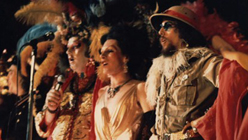Stage Left: A Story of Theater in San Francisco, Austin Forbord’s compact yet ambitious history of Bay Area stagecraft, reminds us how much duller and more conservative this city is today than even 20 years ago. That’s not its primary intent, nor is the documentary overly nostalgic. I should also note that adventurous productions are presently performed in countless small venues most nights of the week. But the straight truth is that the once-palpable excitement and unpredictability — and the way in which the artists and the audience were so intertwined and fed off each other — no longer exists.
The focus of Stage Left, which airs Sunday, November 11, 2012 as part of KQED-TV’s long-running “Truly CA” documentary series, is the period when remarkable talents such as Hibiscus, Sam Shepard, John O’Keefe, Bill Irwin, George Coates, and Chris Hardman made San Francisco the nation’s capital of daring theater. The film opens with a rapid-fire montage of Beats, hippies, and Lenny Bruce that evokes the tradition of tolerance that made this city a destination for political radicals, queer pioneers, and genre-busting performers drawn to the stage.

The first tip of the fedora goes to the Actor’s Workshop, founded in 1952, which introduced subversive playwrights such as Brecht, Beckett, Pinter, Albee, and Genet to local audiences (including numerous artists, naturally). Its reputation and influence was so widely recognized that New York’s Lincoln Center lured the company away a mere 15 years on.
The swath carved locally by Actor’s Workshop was considerable, from alumnus R.G. Davis’ founding of the S.F. Mime Troupe in 1959 to the courting of William Ball (to fill the void left by the Workshop’s departure) that resulted in American Conservatory Theatre making San Francisco its home in 1967. Among its highlights, the film treats us to rare performance footage of the Mime Troupe’s controversial 1965 production, A Minstrel Show (or Civil Rights in a Cracker Barrel), performed in blackface, and Tartuffe, with which ACT began its admirable run.



